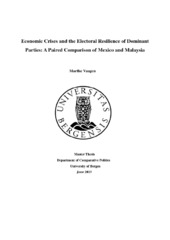Economic crises and the electoral resilience of dominant parties: A paired comparison of Mexico and Malaysia
Master thesis
Permanent lenke
https://hdl.handle.net/1956/7284Utgivelsesdato
2013-06-03Metadata
Vis full innførselSamlinger
Sammendrag
This thesis investigates the electoral resilience of dominant parties in electoral authoritarian regimes under conditions of economic crises. In the field of comparative politics, it is widely assumed that poor economic performance has negative effects on regime-stability - whether authoritarian or democratic. Although this finding is fairly robust across regime types and institutional varieties within regime types, empirical evidence has shown that electoral authoritarian regimes have remained more resilient in the face of economic crisis than other varieties of authoritarian regimes. If the negative relationship between poor economic performance and regime stability is less robust for these regimes, then the obvious question is Why? And more importantly, what differentiates those electoral authoritarian regimes that survive economic crisis and those who do not? This is the question posed in this thesis. By conducting the method of paired comparison and dual process-tracing, I have in this study compared two classic cases of long-lasting dominant party rule - the PRI in Mexico and the UMNO/BN in Malaysia. Both countries experienced severe economic crises in the period from 1980 to 2000. However, the outcomes in these two cases are different: the PRI in Mexico eventually broke down and underwent a transition to democracy in the year 2000; Malaysia's UMNO/BN survives to this day. In order to explain the cases' different outcome on the dependent variable, I have evaluated the relative explanatory power of two theoretical models with respect to evidence from both cases. Through historical process tracing, I have looked at how critical events in the past had consequences for later party strength and hence survival under conditions of economic crisis. The findings of my analysis indicate just how critically important it is that dominant parties in electoral authoritarian regimes have access to a steady stream of resources. Such resources, converted into patronage, are essential for dominant party survival. This argument was supported by both case the case of the survival of the UMNO/BN in Malaysia and the loss of the PRI in Mexico. But I have also discovered that non-material sources of party support are important, and help to explain the UMNO/BN's electoral success. Nonetheless, the inherent limitations of the case-study method make it (arguably) impossible to provide answers to this question which extend beyond the case under examination. However, we can explore it more fully in a larger-N study. Both the findings and the limitations of this thesis point in that direction for future research.
